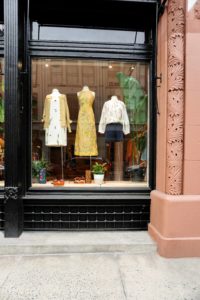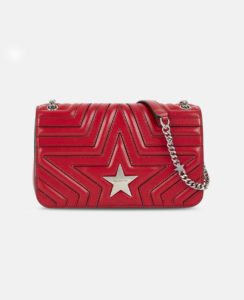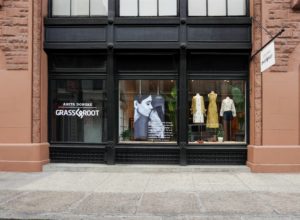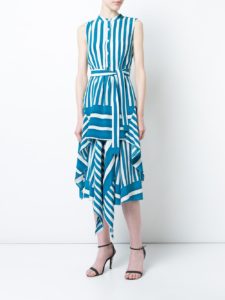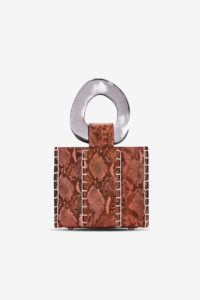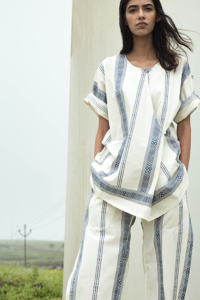In a world fighting climate change, fashion houses can no longer just watch from the side-lines. More and more luxury labels are diving right in, and choosing to source and work ethically and sustainably.
Anita Dongre, Grassroot, NY
Today, the fashion industry accounts for 10 per cent of the global carbon emissions. It also happens to be the second largest industrial polluter after the oil industry. If these weren’t bad enough, there are also social-economic ramifications. However, there’s a rise in awareness among consumers and they are choosing to buy ethical and eco-friendly products, be it couture or high-street. Luxury giants can’t help but step up. Here’s looking at some brands that are slowly and steadily making luxury sustainable and leading the way.
STELLA McCARTNEY
Stella Star Bag, ( Photo Courtesy: stellamccartney.com)
Brand founder Stella McCartney is a visionary. Unknown to many, she changed the game for luxury fashion, before sustainability even became a hot topic. She launched her eponymous label in 2001, a company, which has made animal-friendly and sustainable fashion, the core of its business model. Since its inception, Stella McCarntney has avoided leather, skin, fur or feathers in its clothing. On the brand’s website it says, ‘We believe that the future of fashion is circular—it will be restorative and regenerative by design and the clothes we love never end up as waste’. Sourcing sustainable materials aside, she uses recycled nylon and polyester, which has 24 times less environmental impact as opposed to say, calf leather. McCartney also has a team that audits the Environmental Profit and Loss of every move her company makes. It’s a little wonder then that her stunning creations have legions of fans, including numerous public figures.
GRASSROOT
Grassroot by Anita Dongre
Indian Fashion ace Anita Dongre, has repeatedly professed her love for the handcrafted traditions of India, which are earth-friendly. Perhaps the biggest ode to this was the launch of her craft-based sustainable brand, Grassroot in 2015. Grassroot uses eco-friendly organic cotton and linen, and are, hand-woven by women living in the rural areas across the country. Organic cotton eliminates the use of toxic and persistent chemicals, improves soil health and increases water conservation. Whereas, linen is light as air and durable. It requires the least amount of water, pesticides or other resources and is therefore, very gentle on the environment. When it came to opening her first flagship store in New York in 2017, the brand of choice was Grassroot—which now shares the same roof as the iconic NY designer Anna Sui in the posh neighbourhood of SoHo in Manhattan.
TOME
Tome ( Photo Courtesy: tomenyc.com)
With women empowerment at its epicentre, founders Ryan Lobo and Ramon Martin, took the plunge into sustainable fashion in 2014 with the launch of their White Shirt Project campaign. The project was flagged off to raise funds and awareness for the Freedom for All charity, which fights human-trafficking and modern-day slavery. The brand uses eco-friendly materials and has acquired a prominent spot in the high-fashion sustainable market. Since teaming up with various charities in different capacities, the designers have advanced their approach to a holistic design process. The duo now incorporates sustainability across the brand—by visiting the women in their factories, continually monitoring their supply chains, and also by producing locally, in a bid to reduce pollution.
EDUN
Edun Bibi Foil Mini Tote (Photo Courtesy: Edun.com)
In 2005, philanthropists and public figures, singer Bono and his wife Ali Hewson founded EDUN, a fair trade brand that promotes ethical trade in Africa. Four years after its launch, EDUN became a part of the luxury conglomerate, LVMH group. The brand, according to its website—‘is building long-term growth opportunities by working with artisans, manufacturers and community-based initiatives to develop high-end designer products that celebrate and challenge ethical and sustainable fashion’. Since 2017, 80 per cent of EDUN’s production is made in Africa and the remaining 20 per cent is locally produced in the States. The collections’ use organic, recycled and upcycled fabrics. The label has partnered with many initiatives that promote ethical practices across the fashion industry. One such partner being, the Ethical Fashion Initiative, Burkina Faso, which believes in a responsible fashion industry—where workers earn a living wage and are offered dignified working conditions, while also reducing the ill effects on the environment.
SHIFT
Shift, Cruise 2018 ( Photo Courtesy: lemillindia.com)
An alumnus of London College of Fashion, Indian designer Nimish Shah launched Shift in 2011, which is now a brand built on the passion for conservation of not only traditional Indian crafts but also the environment. Shah, uses a variety of sustainable materials, end-of-line fabrics and conscious pattern-cutting to reduce factory waste. All of the garments are made at the company’s studio in Mumbai, India. The brand uses a range of organic, fair trade and natural fibres along with artisanal handloom textiles in both organic and conventional cotton and silk. All fabrics are sourced from ethical and reliable manufactures. Khadi is sourced from government-certified vendors. No wonder then that Bollywood actor and fashionista Sonam Kapoor-Ahuja is a fan!
GUCCI
While the luxury giant still has a long way to go to be fully sustainable, it’s taking a stand against fur. The brand has pledged to stop using fur in their collections, starting with the spring/summer 2018 collection and beyond. In a statement released by the brand, Marco Bizzarri, President and CEO said: “Being socially responsible is one of Gucci’s core values, and we will continue to strive to do better for the environment and animals. With the help of HSUS and LAV, Gucci is excited to take this next step and hopes it will help inspire innovation and raise awareness, changing the luxury fashion industry for the better.” Gucci now stands in esteemed company of other luxury labels like Armani, Ralph Lauren, Vivienne Westwood and Donna Karen who have all decided to go fur-free.
The onus of environmental impact does not solely lie on fashion labels alone. The responsibility equally lies with the consumers and the choices they make. We must become aware of what we’re buying and its bearing on our planet and the artisans working on them. Slow-fashion is the only way forward. Yes, prices are often higher because they incorporate sustainable resources and fair wages. After all, looking, feeling and doing good are no longer mutually exclusive. And, it’s all in fashion.

